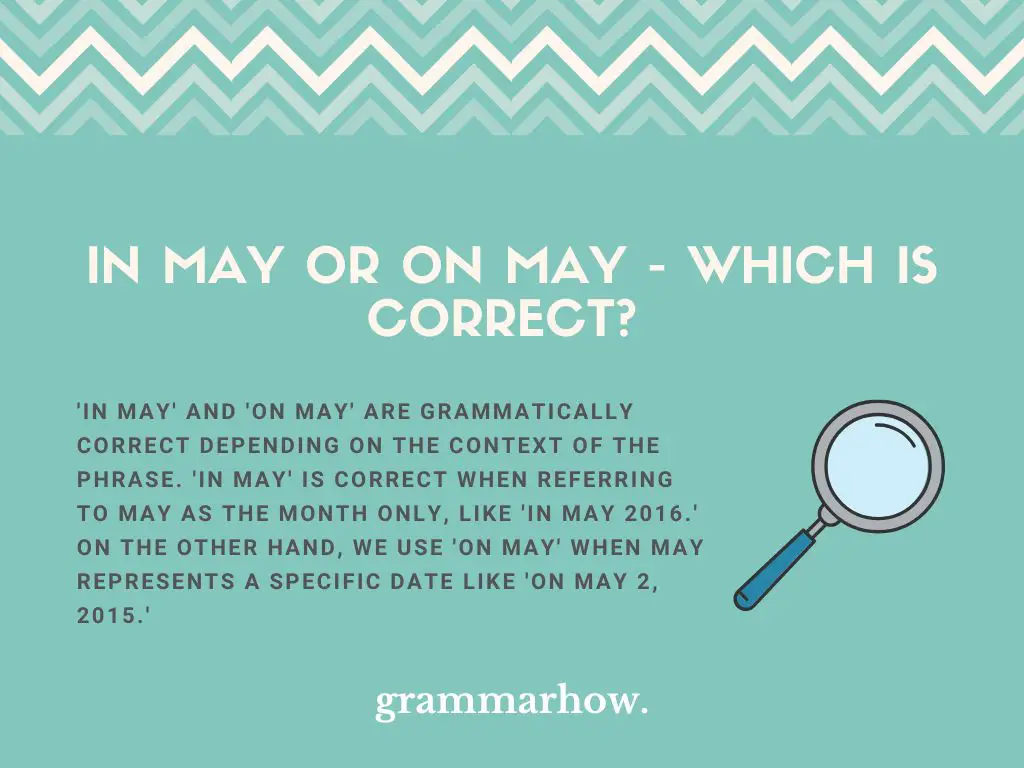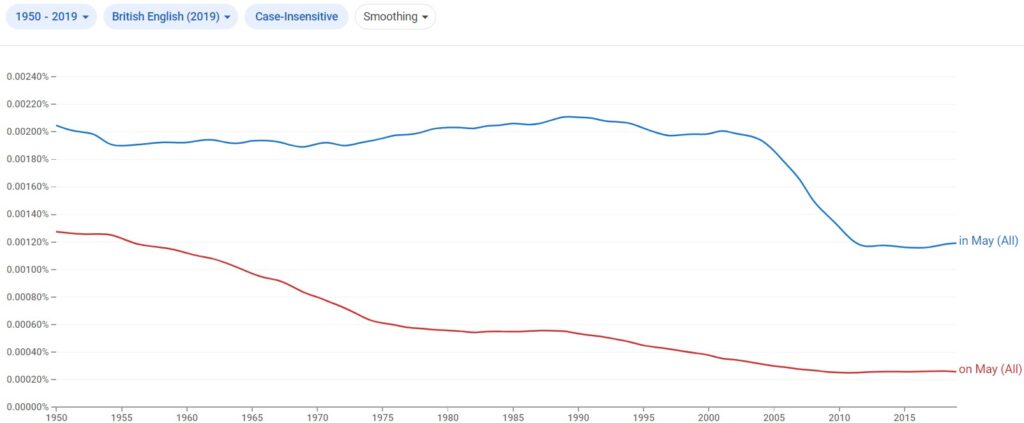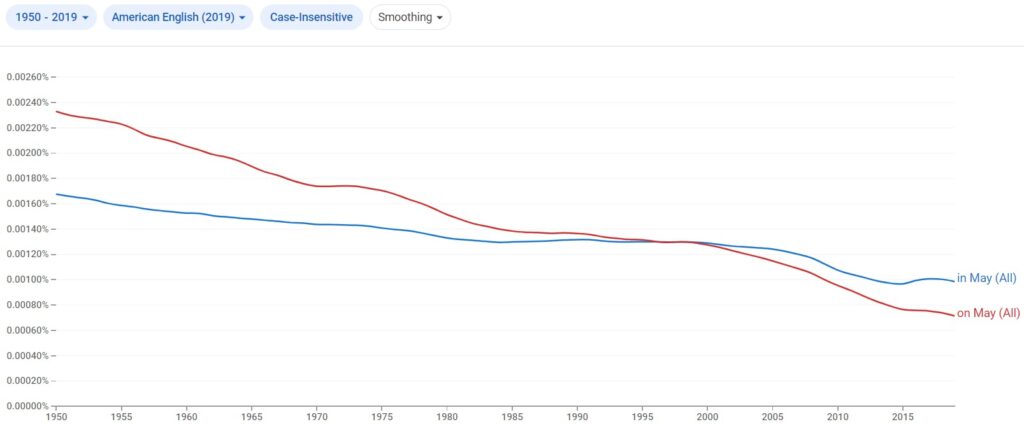One of the first lessons we encounter in learning English is prepositions and how to use them properly. However, even after years of studying them, it’s still easy to confuse prepositions with each other. For example, when do we use ‘in’ or ‘on’ when talking about months? Let’s find out!
In May or On May – Which Is Correct?
‘In May’ and ‘on May’ are grammatically correct depending on the context of the phrase. ‘In May’ is correct when referring to May as the month only, like ‘In May 2016.’ On the other hand, we use ‘on May’ when May represents a specific date like ‘on May 2, 2015.’

‘On’ and ‘in,’ when used with ‘May’ or other months, become prepositions of time. The three main prepositions of time are ‘at,’ ‘on,’ and ‘in.’
By rules of prepositions, we use ‘at’ for specific times like ‘at noon’ or ‘at 6 in the morning.’
On the other hand, we use ‘on’ for days and dates. So, we say ‘on Sunday’ and ‘on March 3.’
We use ‘in’ for months, years, centuries, or generally long periods of time. So, that’s ‘in February’ and ‘in five years.’
Following the rules of prepositions of time, we can say that both ‘in May’ and ‘on May’ are grammatically correct, but the two prepositions are not interchangeable.
We can only use ‘in May’ when referring to the month in general as ‘in’ is only used for long periods of time.
On the other hand, we use ‘on May’ only when we refer to a specific date like ‘on May 23.’ We cannot say ‘on May’ alone or ‘in May 23.’
In May
We use ‘in May’ when referring to May as the whole month of May itself. ‘In,’ as a preposition of time, is used to define long periods like months, years, decades, etc. We use it when we want to refer to May generally or the month as a whole.
‘In’ is used to refer strictly only to long periods of time. We, therefore, cannot say ‘in May 2’ as May 2 is one specific day only. However, we can say ‘in May 2021,’ for example, as adding the year does not make the period specified. ‘May 2021’ still refers to the whole month of May, which is still a long period of time, thus using ‘in.’
Below are examples of using ‘in May’ in a sentence.
- In May 2021, a famous cellphone brand launched a new model of their cellphone.
- In May 2022, our team will open a new branch for our store downtown.
- I’ll be out of town in May.
- Instead of June, can you return home in May instead?
- In May 2019, many businesses thrived.
- What is this place like in May?
- I’ll be holding my show in May.
On May
We use ‘on May’ when referring to a specific day or date in May. ‘On,’ as a preposition of time, is used to define days and dates. We say ‘on May,’ when referring to a specific date in May, like ‘on May 31’ or ‘on the third of May.’
‘On’ is mostly preferred to refer to days and specified dates. While saying ‘on May 2022’ is not entirely incorrect as there is still some specification to it. ‘May 2022’ is not a very specified date, otherwise to the purpose and definition of ‘on’ as a preposition of time. We use ‘on’ mostly on more specified dates like ‘on May 16’ or ‘on the second week of May.’
Below are examples of using ‘May’ in a sentence.
- On May 12, 2022, we will launch a new organization for the environment.
- Hera’s birthday is on May 17, right?
- On May 21, 2021, our school held a small career webinar.
- Is there any important event happening on May 5?
- Why is May 4 your favorite day?
- They launched this business on May 28, 2021.
In May or On May In the UK?
According to the UK Google Ngram Viewer, ‘in May’ is used more often than ‘on May.’ While the two are grammatically correct, it may be because ‘in May’ is less specific and more general, and may generally be applicable to a variety of contexts.

In May or On May In the US?
According to the US Google Ngram Viewer, for US English, ‘in May’ is also used more often than ‘on May,’ though they crossed sometime in the 1990s. While the gap is not large, ‘in May’ is most probably used more often because it’s a lot more general.

Final Thoughts
‘On May’ and ‘in May’ are both grammatically correct but are used in different contexts. ‘On May’ is for talking about specific dates or days, like ‘on May 14.’ On the other hand, ‘in May’ is when talking about the month in general, like ‘in May’ or ‘in May 2020.’

Martin holds a Master’s degree in Finance and International Business. He has six years of experience in professional communication with clients, executives, and colleagues. Furthermore, he has teaching experience from Aarhus University. Martin has been featured as an expert in communication and teaching on Forbes and Shopify. Read more about Martin here.
